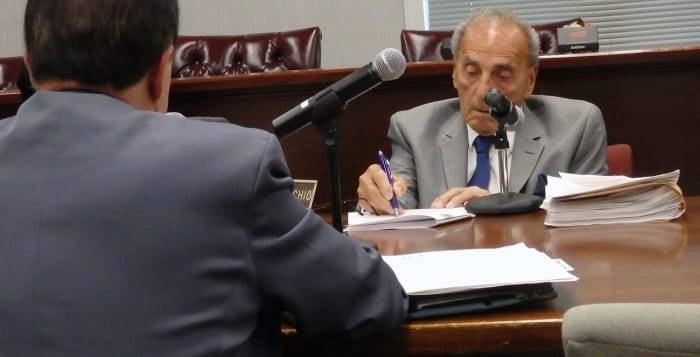Fred Leute, the code enforcement chief in the Village of Port Jefferson, has been suspended with pay.
In an email, Deputy Mayor Kathianne Snaden, the village’s public safety commissioner, confirmed Leute’s suspension.
“Chief Leute has been suspended with pay until further notice,” Snaden said. “The department is running smoothly, and the village is safe and in good hands.”
The news comes just days after Leute delivered the department’s monthly report on public safety during a Board of Trustees meeting held Monday, Feb. 6.
Mayor Margot Garant said in an interview that Leute “had the opportunity to resign, and if he didn’t resign, then he has been informed that he will be brought up on the [New York Civil Service Law Section] 75 disciplinary charges and potentially have a hearing.”
When asked whether any particular incident precipitated the suspension, Garant declined to provide further details. “I cannot disclose anything that’s led up to this,” the mayor said. “He has rights. There’s a procedure to follow — being brought up on charges and having the hearing that he’s entitled to.”
Asked whether she or the village board had decided to suspend, Garant said, “The Board of Trustees was fully informed in exec session — and the labor attorney as well. There is no technical vote that has to happen until a hearing officer, after the hearing, makes a recommendation to the Board of Trustees.” She added, “Based on that recommendation, we will then take further action.”
Section 75
The state law requires that an employee covered under Section 75 “may not be removed or otherwise subjected to disciplinary penalty except for incompetency or misconduct shown after a hearing upon stated charges.”Village residents ‘have to assume that the person being charged is not guilty, and they shouldn’t expect any details until the hearing process has proven otherwise.’
— Ken Girardin
Ken Girardin, a fellow at the Albany-based Empire Center for Public Policy, has extensively researched the Section 75 disciplinary review process. In an interview, he said the guidelines have been in place for nearly a century, laying out the ground rules by which a public employee can be charged and disciplined.
Section 75 “sets a process where those charges can be laid out and answered in a court-like setting, where an employee can bring witnesses in his or her defense,” he said, offering elected officials “an opportunity to decide whether that discipline should be meted out.”
Girardin suggested a degree of confidentiality is embedded within the review process to protect the due process rights of public employees.
“With respect to the public, there’s always a tough balance between keeping the public apprised of what’s going on and respecting employees when charges have not yet been substantiated,” he said. “But with respect to transparency, the public has an absolute right to know whenever an employee is disciplined” following a Section 75 hearing.
Along with transparency is the matter of cost, which Girardin stated can quickly add up. Between the expense of paying a hearing officer, prosecutor, stenographer, potential witnesses and the suspended employee, he said municipalities must weigh the costs of going through with a hearing.
“The cost becomes a part of the calculation with employee discipline,” Girardin said, adding that mounting costs often increase the likelihood of a settlement, “the terms of which the public should know.”
Given the sensitive nature of the dispute, Girardin maintains that village officials are in a difficult bind, simultaneously weighing competing values of promoting transparency while respecting due process.
“To be fair, it puts them in a really weird spot,” he said. “Because it is a personnel matter, where someone is potentially still without fault here, it’s really hard for them to talk about it.”
For village residents who may wish to stay informed about a potential disciplinary proceeding, Girardin implored them to wait patiently and to respect the procedures put in place.
“They have to assume that the person being charged is not guilty, and they shouldn’t expect any details until the hearing process has proven otherwise,” he said.
A moment in village history
In Leute’s absence, deputy chief John Borrero has assumed the role of acting chief. Garant ensured that the transition within the code department was relatively smooth.
“Everything is pretty automated up there,” she said. “We’re… assuring the ladies and gentlemen of the code bureau that they’re going to continue to get the support that they have always gotten from the administration and from the executive team here.”
Leute’s suspension also came shortly after Garant announced her retirement from public service. When asked if there was any connection between the two matters, she said they were unrelated.
“Unfortunately, this is the way the timing worked out,” the mayor said. “It is just a coincidence,” adding, “I wish that the timing had been altogether different.”






